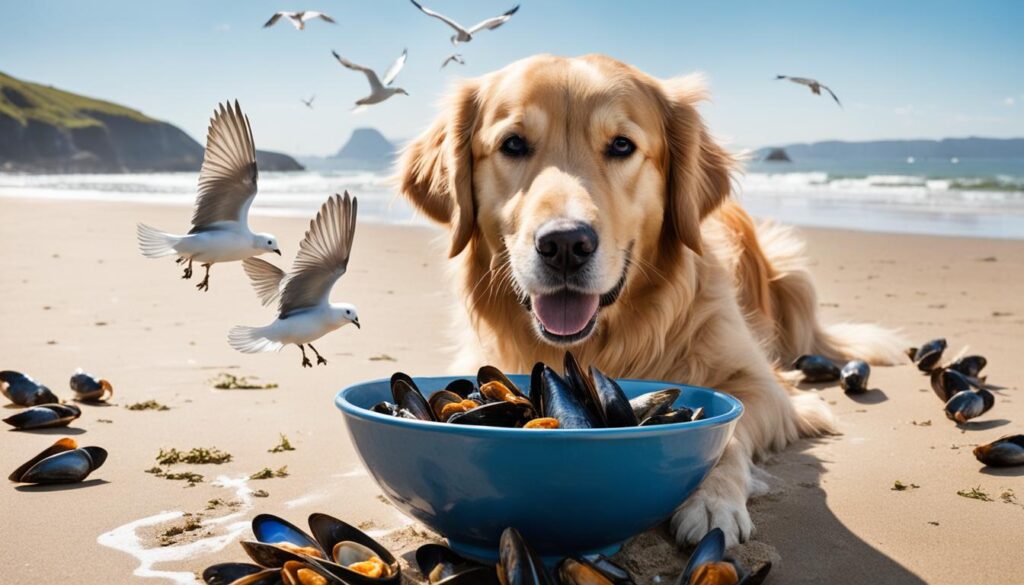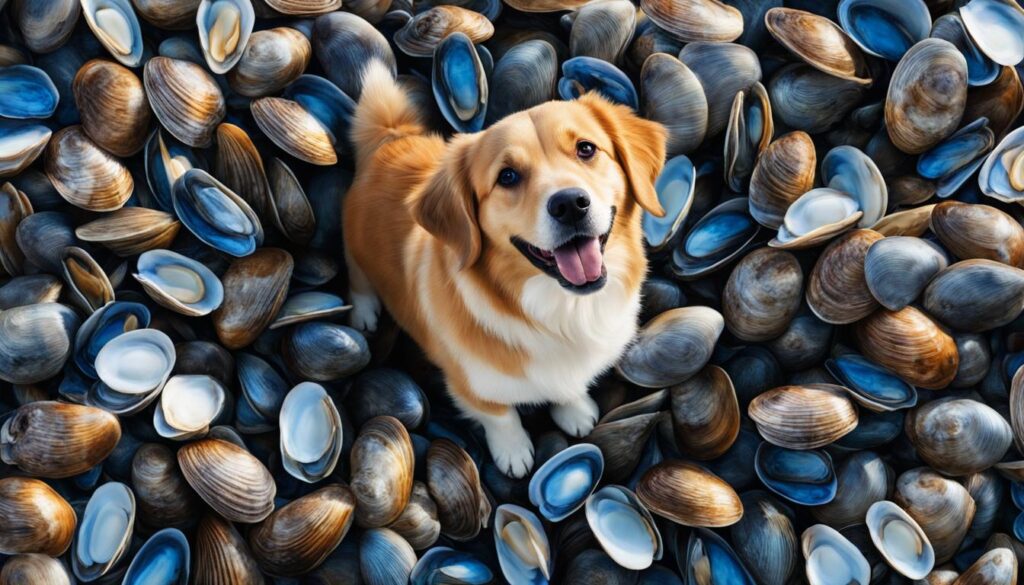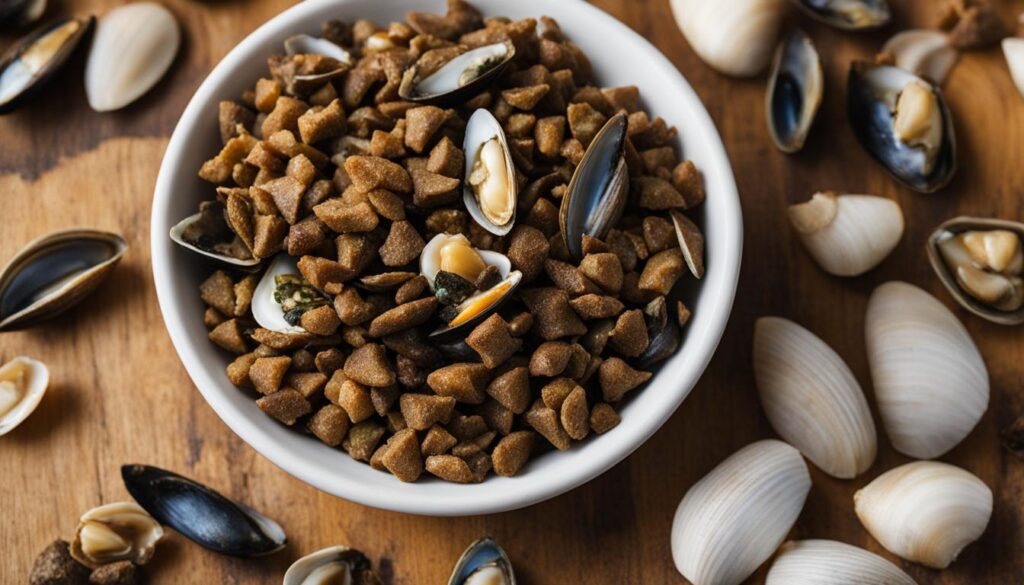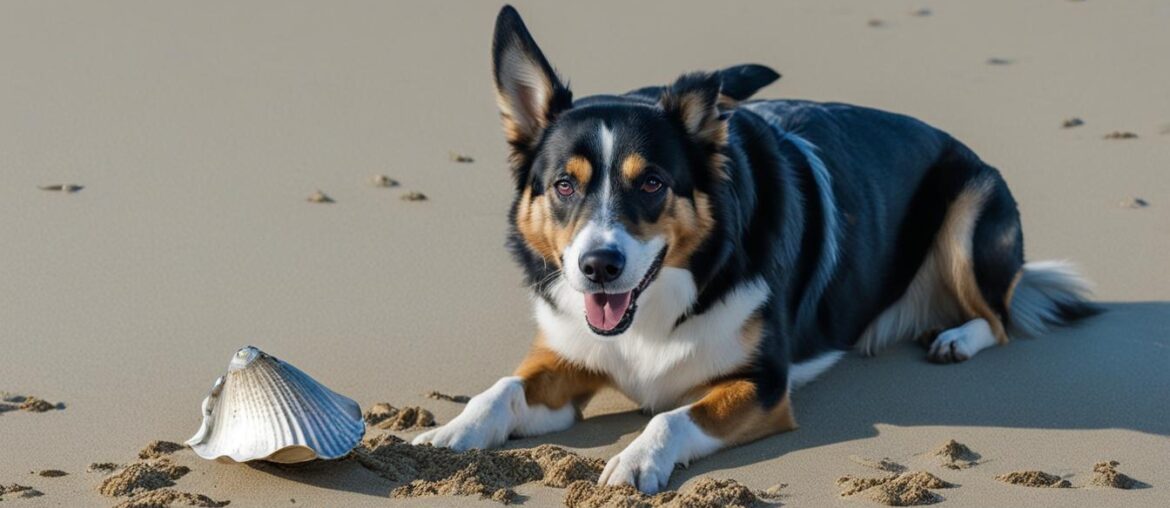As a dog owner, you may have wondered whether it is safe for your furry friend to enjoy clams. Well, the answer is yes, dogs can eat clams, but there are important factors to consider. In this article, I will uncover the truth about dogs and clams, exploring the benefits, risks, and how to safely incorporate clams into your dog’s diet.
Key Takeaways:
- Clams can be a safe and nutritious option for dogs when introduced gradually and consumed in moderation.
- Cooked clams are safe for dogs, but raw or undercooked clams can be harmful.
- Clams are rich in protein and omega-3 fatty acids, offering potential health benefits for dogs.
- Monitor your dog for any signs of allergic reactions or digestive issues after introducing clams into their diet.
- Consult with a veterinarian to determine the appropriate portion size and frequency of feeding clams to your dog.
Can Dogs Eat Mussels?

Dogs can safely consume mussels as part of their diet. Mussels are not only safe for dogs but also offer a range of health benefits. They are a nutritious source of long-chain omega-3 fatty acids, selenium, zinc, iron, vitamin B12, and folate.
Mussels are considered a healthy protein option for dogs and can be a valuable addition to their meals. However, it is crucial to note that only non-freshwater mussels should be fed to dogs.
When preparing mussels for dogs, they can be cooked by boiling or steaming them. Once cooked, the flesh can be removed from the shells and served to dogs plain or mixed in with their regular food. This ensures that the mussels are safe for consumption.
In addition to cooked mussels, there are also freeze-dried mussel treats available for dogs. These treats retain all the nutritional benefits of mussels in a convenient and delicious form.
The Nutritional Benefits of Mussels for Dogs
Mussels offer numerous health benefits for dogs due to their nutrient-rich composition. The key nutritional benefits of mussels for dogs include:
- Long-chain omega-3 fatty acids: Support healthy skin and coat, reduce inflammation, and aid in joint health.
- Selenium: Acts as an antioxidant and aids in the proper functioning of the immune system.
- Zinc: Essential for immune system function, wound healing, and maintaining healthy skin and coat.
- Iron: Plays a vital role in red blood cell production and overall energy levels.
- Vitamin B12: Supports neurological function, promotes healthy digestion, and aids in the production of red blood cells.
- Folate: Important for cell growth and development, as well as maintaining a healthy metabolism.
With their diverse range of nutrients, mussels can contribute to a well-rounded and balanced diet for dogs.
Risks and Precautions
While mussels are generally safe for dogs, there are a few considerations to keep in mind:
- Always avoid feeding dogs freshwater mussels, as they may contain harmful toxins.
- Ensure that mussels are properly cooked before giving them to dogs to avoid the risk of parasites.
- Monitor your dog for any adverse reactions or allergies after introducing mussels to their diet.
- If your dog experiences any digestive issues or symptoms of illness after consuming mussels, consult with a veterinarian.
Incorporating Mussels into Your Dog’s Diet
When incorporating mussels into your dog’s diet, it is essential to consider their overall nutritional needs. Mussels can be included as part of a varied and balanced diet that includes other protein sources, carbohydrates, fruits, and vegetables.
If you are unsure about the portion size or frequency of feeding mussels to your dog, it is recommended to consult with a veterinarian or a professional pet nutritionist.
| Mussels in a Dog’s Diet | Amount | Frequency |
|---|---|---|
| Mussel meat (cooked) | Small to moderate amounts | Occasional |
| Freeze-dried mussel treats | Follow package instructions | As a reward or snack |
| Mussel supplement or powder | Follow package instructions | As recommended by a veterinarian |
Incorporating mussels into your dog’s diet can provide them with essential nutrients and contribute to their overall health and well-being.
Benefits of Clams and Mussels for Dogs

Clams and mussels are not only a delicious seafood delicacy for humans but also offer numerous health benefits for dogs. These shellfish are packed with essential nutrients that contribute to a well-rounded and nutritious diet for your furry friend.
Nutritional Benefits
Clams and mussels are a rich source of omega-3 fatty acids, which are essential for promoting healthy skin and coat in dogs. These fatty acids also have anti-inflammatory properties and can support joint health, reducing the risk of conditions such as arthritis.
In addition to omega-3 fatty acids, clams and mussels provide important minerals such as selenium, zinc, and iron. These minerals contribute to various bodily functions and help maintain overall health and wellbeing in dogs. Clams and mussels are also a great source of vitamin B12 and folate, which play a vital role in cell function and the production of red blood cells.
Vitamins and Minerals in Clams and Mussels
| Nutrients | Clams | Mussels |
|---|---|---|
| Vitamin B12 | Excellent source | Excellent source |
| Omega-3 Fatty Acids | High levels | High levels |
| Selenium | Good source | Good source |
| Zinc | Good source | Good source |
| Iron | Good source | Good source |
These vitamins and minerals contribute to various aspects of your dog’s health and are important for their overall wellbeing. Incorporating clams and mussels into your dog’s diet can help ensure they receive these essential nutrients.
Protein Content
Clams and mussels are also an excellent source of protein, which is essential for muscle growth and repair in dogs. Protein is necessary for maintaining strong muscles, promoting tissue regeneration, and supporting overall growth and development.
“Clams and mussels offer a natural and nutrient-rich way to enhance your dog’s diet.”
By including clams and mussels in your dog’s meals, you are providing them with a natural and nutrient-rich food that can contribute to their overall health and wellbeing. Just like humans, dogs can benefit from the nutritional value of these shellfish.
Incorporating clams and mussels into your dog’s diet can be as simple as adding them to their regular meals or offering them as occasional treats. However, it is important to introduce these shellfish gradually to gauge your dog’s tolerance and ensure they do not have any allergies or sensitivities.
Remember, every dog is different, and it’s always best to consult with your veterinarian before making any significant changes to your dog’s diet. They can provide personalized guidance based on your dog’s specific nutritional needs and health considerations.
In summary, clams and mussels offer several nutritional benefits for dogs, including omega-3 fatty acids, vitamins, minerals, and protein. These shellfish can promote healthy skin and coat, reduce inflammation, support joint health, and contribute to overall wellbeing. When incorporated appropriately into a balanced diet, clams and mussels can be a valuable addition to your dog’s nutritional routine.
Risks of Dogs Eating Clams and Mussels

While clams and mussels can be safe and healthy for dogs in moderation, it is important to be aware of the potential risks associated with their consumption. Dogs may have allergies or sensitivities to clams and mussels, which can lead to adverse reactions. Symptoms such as hives, itching, and respiratory issues may indicate an allergic response to these shellfish. It is essential to closely monitor dogs for any signs of an allergic reaction after introducing clams and mussels into their diet.
Another concern when feeding clams and mussels to dogs is their digestibility. Improperly cooked or prepared clams and mussels can pose digestion problems for dogs. Undercooked or spoiled shellfish may lead to gastrointestinal issues, such as digestive upset, vomiting, or diarrhea. To minimize the risks, it is crucial to ensure that clams and mussels are thoroughly cooked and free from any contaminants.
To introduce clams and mussels into a dog’s diet safely, it is recommended to start with small amounts and observe how the dog responds. If there are no adverse reactions and the dog tolerates the shellfish well, the portion size can be gradually increased. However, if a dog has known allergies or sensitivities, consultations with a veterinarian are advised before introducing clams and mussels into their diet.
It is important to note that every dog is unique, and their tolerance and reaction to clams and mussels may vary. Consulting with a veterinarian for personalized guidance is always recommended, especially if there are concerns about potential allergies, sensitivities, or digestive issues.
Including Clams and Mussels in a Balanced Dog’s Diet

When it comes to incorporating clams and mussels into your dog’s diet, it’s important to prioritize their nutritional requirements and maintain a balanced eating plan. Including clams and mussels as part of a varied and nutritious diet that consists of other protein sources, carbohydrates, fruits, and vegetables can provide numerous health benefits for your furry friend.
Consulting with a veterinarian or a professional pet nutritionist can help you determine the appropriate portion size and frequency of feeding clams and mussels to your dog. Keep in mind that dogs have unique dietary needs that depend on factors such as their age, size, activity level, and overall health. By considering these factors and providing a well-rounded diet, you can ensure that your dog enjoys the nutritional benefits of clams and mussels while meeting their specific requirements.
Remember to introduce clams and mussels gradually into your dog’s meals to gauge their tolerance and avoid any digestive issues. Monitoring your dog for any signs of allergies or adverse reactions is crucial to their overall well-being. If you have any concerns or your dog has known allergies or sensitivities, it’s best to seek guidance from a veterinary professional.
The Benefits of Including Clams and Mussels in Your Dog’s Diet
Clams and mussels are packed with essential nutrients that can contribute to your dog’s overall health. These shellfish are excellent sources of omega-3 fatty acids, selenium, zinc, iron, vitamin B12, and folate. Incorporating these nutrients into your dog’s diet can support various bodily functions and promote overall well-being.
Omega-3 fatty acids, in particular, play a vital role in maintaining healthy skin and coat, reducing inflammation, and supporting joint health. The protein content found in clams and mussels is crucial for muscle growth and repair. Additionally, the vitamins and minerals present in these shellfish contribute to your dog’s overall health and vitality.
By including clams and mussels in your dog’s meals, you can enhance their nutritional profile and provide them with added health benefits.
| Nutrient | Clams | Mussels |
|---|---|---|
| Protein | 15g per 100g | 24g per 100g |
| Omega-3 Fatty Acids | 0.24g per 100g | 0.53g per 100g |
| Selenium | 45mcg per 100g | 48mcg per 100g |
| Zinc | 2.3mg per 100g | 2.3mg per 100g |
| Iron | 13mg per 100g | 6.7mg per 100g |
| Vitamin B12 | 98.9mcg per 100g | 20mcg per 100g |
| Folate | 12mcg per 100g | 0mcg per 100g |
Clam-Based and Mussel-Based Dog Foods

Commercial dog foods with clam or mussel as the primary ingredient or a significant component are available in the market. These clam-based or mussel-based dog foods offer a convenient way to incorporate clams and mussels into a dog’s regular diet. They are formulated to meet the nutritional needs of dogs while providing the benefits of clams and mussels. These dog foods may also contain other ingredients that contribute to overall health and wellbeing, such as additional protein sources, carbohydrates, vitamins, and minerals.
When choosing a clam-based or mussel-based dog food, it is important to consider the quality of the ingredients, the reputation of the brand, and any specific dietary requirements or sensitivities of the dog. Consulting with a veterinarian can help in selecting the right clam-based or mussel-based dog food for your pet.
| Clam-Based Dog Foods | Mussel-Based Dog Foods |
|---|---|
| Brands X, Y, Z | Brands A, B, C |
| Nutritional composition | Nutritional composition |
| Benefits and features | Benefits and features |
| Price range | Price range |
| Availability | Availability |
Clam and Mussel Treats for Dogs

In addition to incorporating clams and mussels into their regular diet, dogs can also enjoy clam and mussel treats. Commercial clam and mussel treats for dogs are available in various forms, such as freeze-dried treats or dehydrated chews. These treats provide a flavorful and nutritious option for dogs to enjoy as a reward or snack. Clam and mussel treats can offer the same health benefits as fresh clams and mussels, including the omega-3 fatty acids and other essential nutrients.
When selecting clam and mussel treats for dogs, it is important to choose products that are made with high-quality ingredients and do not contain any harmful additives or preservatives. Reading product labels and consulting with a veterinarian can help in choosing the best clam and mussel treats for your furry friend.
| Treat Name | Description | Ingredients | Benefits |
|---|---|---|---|
| Sea Biscuits Clam & Mussel Treats | Freeze-dried treats | Clams, mussels, natural flavors | Rich in omega-3 fatty acids, protein, and vitamins |
| Mussel Munchies | Dehydrated chew sticks | Mussels, sweet potatoes | High in antioxidants, promotes dental health |
| Clam Delights | Grain-free treats | Clams, peas, chickpeas | Supports healthy digestion, aids in weight management |
Wrapping Up
In conclusion, clams and mussels can be safe and nutritious additions to a dog’s diet when fed in moderation and under the right circumstances. It is crucial to ensure that clams and mussels are properly cooked, devoid of harmful additives, and that the dog does not have any allergies or sensitivities to these shellfish. Both clams and mussels are rich in essential nutrients like omega-3 fatty acids, selenium, zinc, iron, vitamin B12, and folate, which contribute to a balanced diet and promote overall health and wellbeing in dogs.
However, it is important to closely monitor dogs for any adverse reactions or digestive issues after introducing clams and mussels into their diet. If any signs of illness or allergies arise, consulting with a veterinarian is highly recommended. Implementing clams and mussels into a dog’s diet should be done gradually and with careful consideration to their specific nutritional needs and health conditions.
By seeking professional guidance and incorporating clams and mussels thoughtfully into a dog’s diet, pet owners can enjoy the benefits of these shellfish while ensuring their furry friends receive an optimal and balanced nutritional intake.
FAQ
Can dogs eat clams?
Yes, dogs can eat clams in small or moderate amounts, but it is important to introduce them gradually to gauge their tolerance. Cooked clams are safe for dogs, but raw or undercooked clams can be harmful due to the risk of parasites.
Can dogs eat mussels?
Yes, dogs can eat mussels as long as they are properly cooked. Mussels are nutritious and contain essential nutrients like omega-3 fatty acids, selenium, zinc, iron, vitamin B12, and folate.
What are the benefits of clams and mussels for dogs?
Clams and mussels offer several benefits for dogs. They are nutritious and provide essential nutrients like omega-3 fatty acids, selenium, zinc, iron, vitamin B12, and folate. These nutrients contribute to a healthy diet and support various bodily functions in dogs.
What are the risks of dogs eating clams and mussels?
While clams and mussels can be safe for dogs in moderation, there are some risks associated with their consumption. Dogs may have allergies or sensitivities to clams and mussels, and digestibility can be a concern if they are not properly cooked or prepared.
How can I include clams and mussels in my dog’s diet?
Clams and mussels can be included as part of a balanced diet for dogs. It is recommended to consult with a veterinarian to determine the appropriate portion size and frequency of feeding clams and mussels, taking into account the dog’s nutritional needs and any dietary restrictions.
Are there clam-based or mussel-based dog foods available?
Yes, there are commercial dog foods available that are formulated with clams or mussels as the primary ingredient or a significant component. These clam-based or mussel-based dog foods offer a convenient way to incorporate clams and mussels into a dog’s regular diet.
Can dogs have clam and mussel treats?
Yes, there are clam and mussel treats available for dogs. These treats provide a flavorful and nutritious option for dogs to enjoy as a reward or snack. Clam and mussel treats can offer the same health benefits as fresh clams and mussels.






